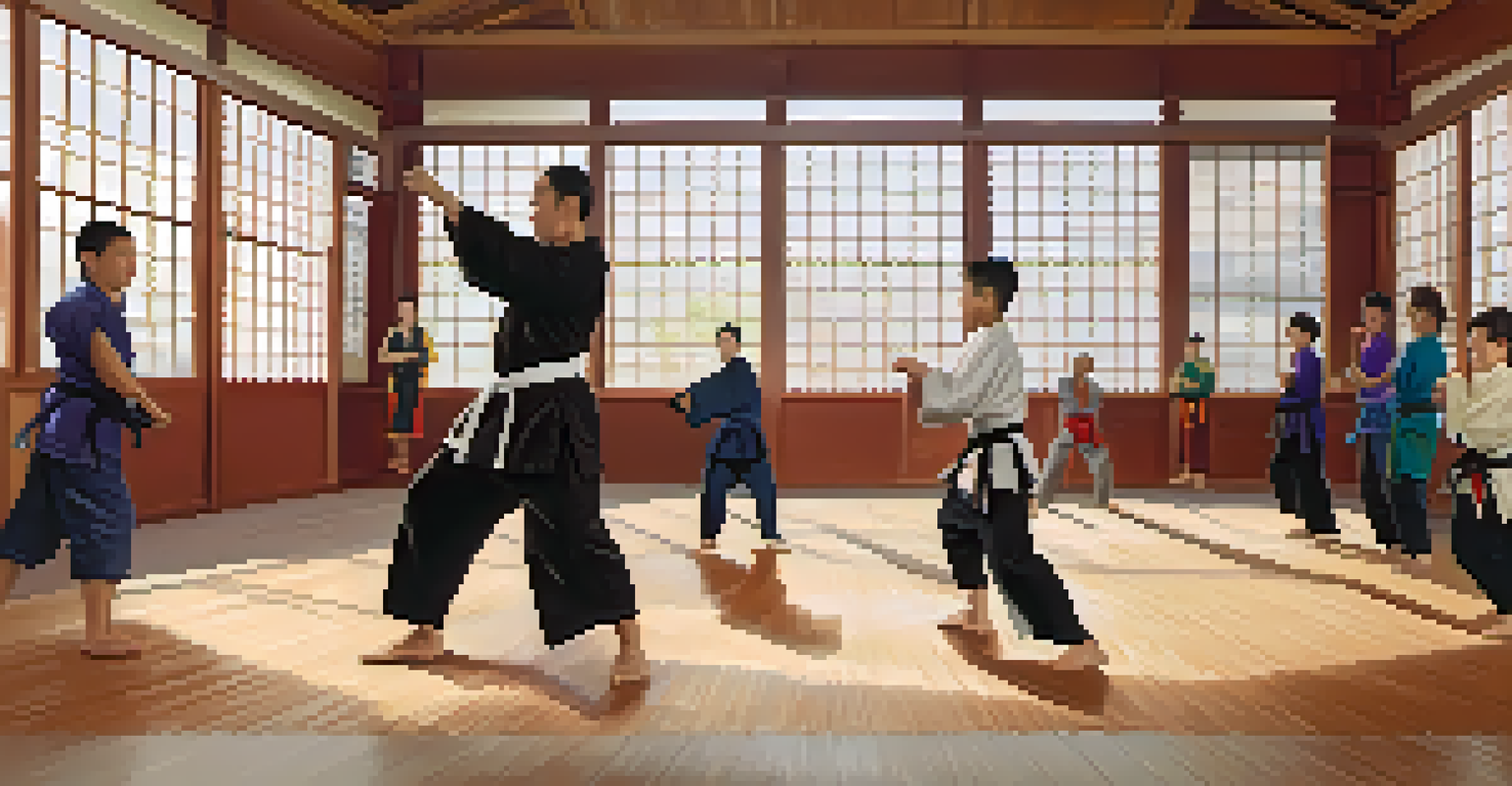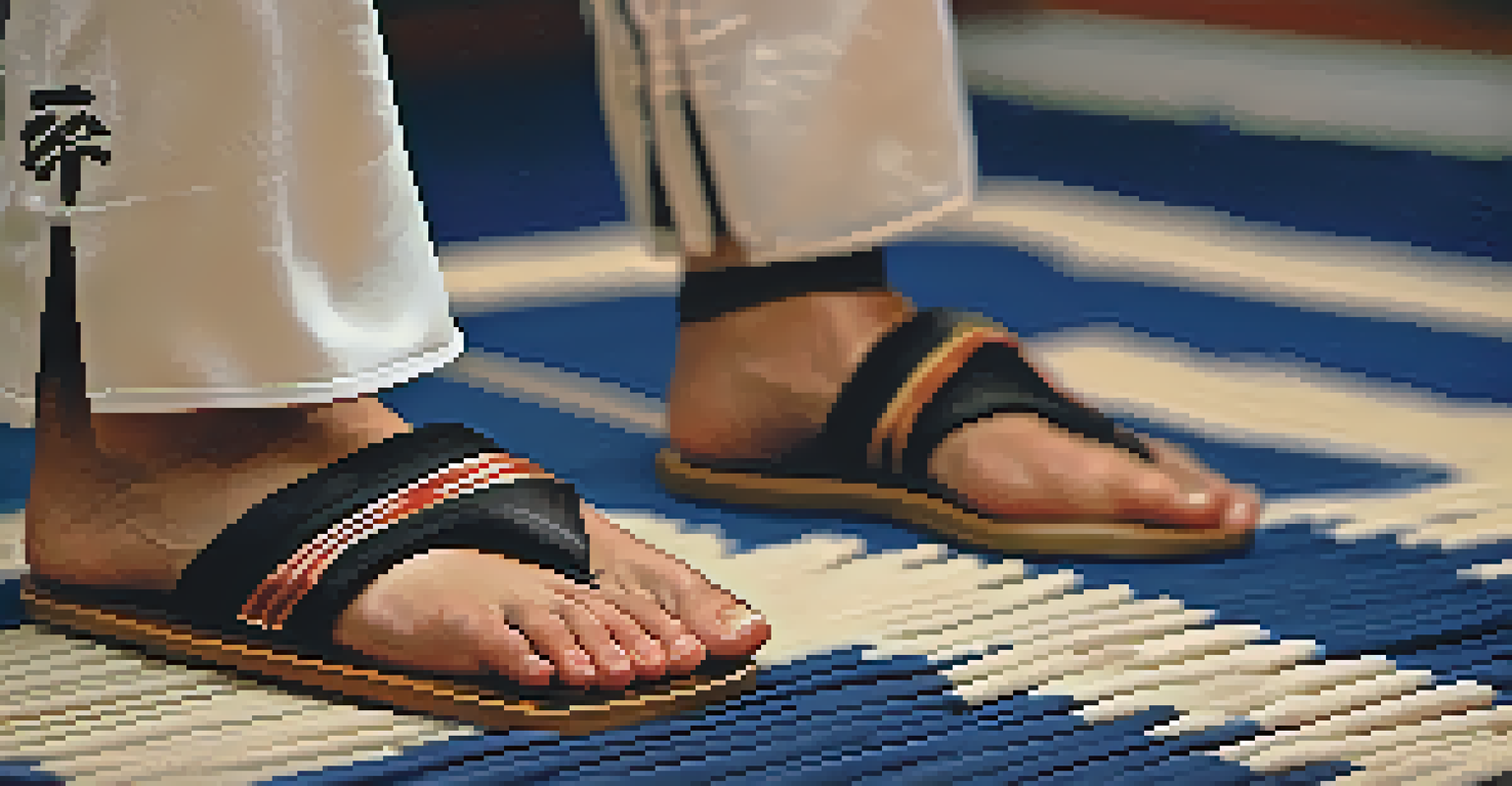Incorporating Martial Arts into Your Rehab Program

Understanding the Benefits of Martial Arts in Rehab
Martial arts offer a unique approach to rehabilitation by combining physical activity with mental discipline. This blend helps not only in physical recovery but also boosts self-confidence and mental resilience. For example, practicing techniques like tai chi can improve balance and coordination, which is crucial during rehabilitation.
Martial arts is a form of expression, a way to connect with oneself and the world around you, while developing discipline and focus.
Moreover, martial arts often emphasize gradual progression, allowing patients to advance at their own pace. This personalized approach can lead to a more effective recovery process, making it easier for individuals to engage with their rehab programs. Think of it like climbing a staircase; each step builds on the last, leading to a stronger foundation.
In addition, the community aspect of martial arts can provide emotional support, which is vital during rehab. Being part of a supportive environment encourages individuals to stay motivated and focused on their recovery goals.
Choosing the Right Martial Art for Your Needs
When incorporating martial arts into your rehab, it's essential to choose the right style that aligns with your goals and injuries. For instance, if you're recovering from a lower-body injury, styles like judo or karate, which involve more upper-body movement, might be beneficial. Conversely, disciplines like aikido or tai chi can be gentler and focus on fluid movements, making them ideal for those needing a softer approach.

Consider your interests as well; enjoying the practice can significantly enhance your commitment to the rehab process. If you find joy in the movements, you are more likely to stick with the program. This enjoyment can be akin to finding the right workout playlist that keeps you energized and motivated.
Martial Arts Enhances Rehab Recovery
Integrating martial arts into rehabilitation combines physical activity with mental discipline, improving both physical and emotional recovery.
Consulting with a healthcare professional or a certified martial arts instructor is crucial in this selection process. They can help assess your physical limitations and recommend the most suitable martial art for your rehabilitation journey.
Setting Realistic Goals in Martial Arts Rehab
Establishing clear, achievable goals is paramount when integrating martial arts into your rehab program. Start by identifying what you hope to accomplish, whether it's improving mobility, strength, or overall fitness. Setting these goals can be likened to setting up a roadmap for a road trip; knowing your destination helps you plan the best route.
The greatest victory is that which requires no battle.
Breaking down larger objectives into smaller milestones can also make the journey feel less overwhelming. For example, if your goal is to kick higher, start with basic stretches and gradually progress to more complex techniques. This incremental approach not only builds confidence but also reduces the risk of injury.
Remember to celebrate your progress, no matter how small. Each achievement during your martial arts practice reflects your hard work and dedication, making the rehabilitation process more rewarding.
Building Strength and Flexibility Through Martial Arts
One of the primary benefits of martial arts is its ability to enhance strength and flexibility simultaneously. Most martial arts incorporate a variety of movements that engage different muscle groups, promoting overall physical fitness. For example, the stances and kicks in karate not only improve leg strength but also enhance flexibility through dynamic stretching.
Flexibility is particularly important in rehabilitation, as it helps prevent future injuries and promotes a full range of motion. Regular practice of techniques can help stretch and strengthen muscles, making everyday activities easier and more manageable. Think of it as oiling a rusty hinge; a little flexibility can make a significant difference in movement.
Choosing the Right Martial Art Matters
Selecting a martial art that aligns with your rehabilitation needs and personal interests is essential for maintaining motivation and achieving goals.
Incorporating specific exercises that focus on both strength and flexibility into your martial arts training can create a well-rounded rehab program. This holistic approach ensures that you are not just recovering but also building a stronger, more resilient body.
Mindfulness and Mental Focus in Martial Arts
Martial arts training often emphasizes mental discipline and mindfulness, which are crucial for effective rehabilitation. Techniques such as meditation and deep breathing are commonly practiced in martial arts, helping individuals manage pain and stress during recovery. Engaging in mindfulness can be likened to hitting the reset button on your mental state, providing clarity and focus.
Practicing martial arts can also foster a sense of control over one’s body and emotions. As you learn new techniques and overcome challenges, you gain confidence that can translate into other areas of your life. This newfound sense of empowerment can be a vital component of the rehabilitation process.
Incorporating mindfulness practices into your routine can enhance your overall experience in martial arts. This mental aspect not only supports physical recovery but also helps in developing a positive mindset, which is essential for long-term success.
Finding a Qualified Instructor for Your Rehab Journey
Working with a qualified martial arts instructor is crucial for a successful rehabilitation experience. Look for instructors who have experience working with individuals recovering from injuries or those with physical limitations. Their expertise will ensure that you are practicing safely and effectively, minimizing the risk of re-injury.
A good instructor will also provide personalized feedback and modifications to techniques, making the practice more accessible. This is especially important if you are dealing with specific rehabilitation goals or have certain physical restrictions. Think of your instructor as your coach, guiding you through each stage of your recovery journey.
Mindfulness Boosts Rehab Success
Incorporating mindfulness practices from martial arts fosters mental discipline, enhancing both physical recovery and overall well-being.
Don't hesitate to ask potential instructors about their experience and training philosophy. Finding someone who aligns with your goals and understands your unique needs can make a significant difference in your rehabilitation process.
Integrating Martial Arts with Traditional Rehabilitation
Combining martial arts training with traditional rehabilitation practices can create a comprehensive approach to recovery. While physical therapists focus on specific exercises and treatments, martial arts can provide a functional, enjoyable way to apply those skills in real-life scenarios. Consider it a delightful fusion of structured therapy and dynamic movement.
Incorporating martial arts can also enhance motivation and engagement in your rehab program. The fun and social aspects of training can make the often tedious process of rehabilitation feel more enjoyable. Imagine swapping out monotonous exercises for exciting martial arts drills; the difference can be quite refreshing.

Always communicate with your healthcare provider about your martial arts practice. They can help you integrate the two approaches effectively, ensuring that your rehabilitation remains safe and aligned with your recovery goals.